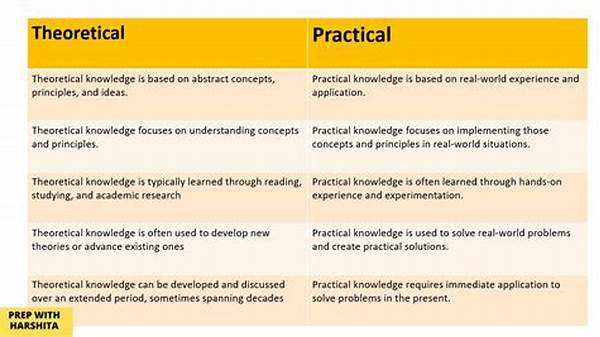Why Practical Skills Beat Theory in Online Classes
Read More : Best Online Platforms For Language Learning Ranked
In the evolving world of education, online classes have become the ultimate stage for knowledge seekers. Yet, one question lingers: “Why do practical skills beat theory in online classes?” Picture this: you’re about to bake a cake for the first time. You have the recipe—a piece of cake, right? But without the dexterity to crack eggs or master the art of folding batter, you’re left with a theoretical masterpiece and a kitchen disaster. Such is the reality of online education today. Let’s dive into why honing practical skills can trounce theory, creating effective learners in the virtual classroom.
Imagine you’re on a digital adventure, exploring the frontiers of knowledge from your living room. Online classes bridge the lecture hall and your couch, offering theoretical concepts at your fingertips. But amidst this convenience, the missing link remains: the practicality of skills. Theory is crucial—don’t get me wrong—but without grounding it in practical applications, learners only skim the surface. As you wrestle with coding quagmires or juggle your virtual chemistry set, the “a-ha” moments emerge not from memorizing formulas but from the Eureka of doing.
Consider Anna, a biology student who aced every quiz yet froze the moment she had to dissect an amphibian. Or Jake, who breezed through written driving tests only to struggle behind the wheel. Their stories exemplify why practical skills beat theory in online classes. Using practical applications to reinforce theory transforms passive knowledge into active expertise. As students practice and apply, it’s like turning the ignition key to start their engines of opportunity.
Online platforms are evolving, pushing the limits with simulations and interactive exercises. Learners like you, eager to make mistakes and explore hands-on scenarios, thrive. Engaging multimedia, gamified learning, and real-world challenges cultivate resilient knowledge. With this approach, you tap into a holistic learning journey, where understanding isn’t just read or observed but experienced. Now, doesn’t that beat lugging a heavy textbook around?
The Power of Active Learning in Digital Education
You might be wondering, “How do practical skills find their way in courses dominated by digital screens and bandwidths?” Interestingly, this blend of theory and hands-on practice creates a dynamo of knowledge—empowering students to conquer subjects with newfound confidence. Why practical skills beat theory in online classes is because they encourage dynamism and adaptability. Real experiences coupled with theory offer a richer, more engrossing educational experience.
—Discussion: Why Practical Skills Beat Theory in Online Classes
The rise of online classes has sparked a global revolution in how we approach learning, bridging geographical and cultural barriers to create a universally accessible educational platform. However, the question that remains relevant is: “Why do practical skills beat theory in online classes?” Let’s navigate this evolving landscape to understand better, and together, we’ll unearth the profound impact of practical knowledge.
Online classes offer the convenience and accessibility that traditional classrooms lack, yet they often emphasize theoretical knowledge over hands-on experience. This has long been a limitation, causing frustration for students and educators alike. Imagine learning to swim via a YouTube video—without ever dipping a toe in the actual water. The gap between theoretical knowledge and skill application remains vast, underscoring why practical skills beat theory in online classes.
A thriving online education system still requires critical analysis to balance theory and practice. It’s fascinating, really, how technology can bridge this divide, creating virtual labs or project-based learning environments simulating real-world scenarios. By leveraging these innovations, students adapt quickly and retain knowledge more effectively, thus reaffirming why practical skills beat theory in online classes.
Take an example from the tech industry where learning to code in a virtual setting is now augmented by platforms offering hands-on coding exercises. Students face real-world challenges mirrored in a controlled environment, honing skills only tackled by industry professionals. Unlike theoretical lectures, this method encourages active problem-solving and creativity, which is precisely why practical skills beat theory in online classes.
In conclusion, online education is dynamic, yet desperately needs a balance where practical skills strengthen theoretical knowledge. The ongoing efforts in educational tech enhancements are commendable, but we need a shift beyond rote learning toward building a truly interactive, skill-based curriculum. Let’s change the narrative and embrace this formidable approach as the cornerstone for future learning.
The Role of Technology in Effective Learning
Understanding the significance of why practical skills beat theory in online classes highlights an imminent need for these adaptable learning environments. The role of technology is central to this transformation, offering tools that can deliver a more engaging and successful educational experience.
Emerging Learning Technologies
Innovations, such as immersive virtual reality (VR) and sophisticated Artificial Intelligence (AI) systems, are the vanguard of this educational renaissance. They hold promise for a tech-savvy generation yearning to answer why practical skills beat theory in online classes.
—Key Points on “Why Practical Skills Beat Theory in Online Classes”
In online education’s humor-filled narrative, where downloading knowledge is akin to updating smartphone apps, irony abounds: the pursuit of theoretical knowledge without its practical counterpart. Think of a world where students skim through manuals yet never brave the building of tangible skills. Embark on an educational revolution—a movement recognizing why practical skills beat theory in online classes.
These realizations shift the priorities of educators and learners alike. Bridging knowledge with experience, they ignite a transformation in digital classrooms. It’s a call to action for educational architects: paint the canvas of e-learning with the vibrant strokes of practical skill application. Let’s create an innovative ecosystem where students emerge not only with degrees but as master artisans of their respective crafts.
Ready to embrace this metamorphosis? Dive deep into the craft of learning by doing. Skills trump knowledge as the postmodern currency in academia and beyond. Incite a classroom rebellion against theoretical dominance and shine a light on the possibility of thriving in a hands-on virtual world.
Addressing Challenges in Education
Understanding this paradigm necessitates analyzing the hurdles educators face while integrating practice with theory. Why practical skills beat theory in online classes reveals underlying implementation challenges yet offers words of promise.
Overcoming Educational Barriers
Through comprehensive research and strategic collaborations, pioneering educators worldwide craft robust curricula adaptable to digital platforms. They pave the road to optimized online learning experiences accommodating diverse student needs.
—Content Summary: “Why Practical Skills Beat Theory in Online Classes”
The journey of practical over theoretical doesn’t stop here. It’s a corridor of knowledge—a paragon meant to usher in a revolution by heralding why practical skills beat theory in online classes.
Thus concludes a call-to-action for institutions and stakeholders at the forefront of educational evolution. Together, they must advocate for a cohesive strategy, weaving practical skill sets into the intricate tapestry of online lessons. As a united front, inspired learners discover not just educational victory but mastery over the age-old query—a quest for skillful, meaningful education that stands the test of time.
The Future of Online Learning
Incorporating practical skills in the expanding realm of virtual education is an exciting endeavor. It’s a brave new frontier where simulations, gamification, and innovative platforms harmonize, proving why practical skills beat theory in online classes.
Bridging Theory and Practice
Education’s brave architects march into this territory, molding future generations equipped with indispensable skills. Ready to evolve amidst the digital splendor, they answer the chronicle of why practical skills beat theory in online classes.
—Why Practical Skills Beat Theory in Online Classes: In-depth Analysis
Online classes have become the educational gold rush, a breeding ground for thinkers and innovators. But amid this learning utopia, there’s a golden rule: why practical skills beat theory in online classes. Here’s an exclusive review of this fundamental truth embellished with stats, wit, and edge.
The allure of online classes is undeniable—parceled learning modules rife with theoretical concepts entice knowledge-seekers far and wide. Yet the educational saga unfolds; many students fixate on chapters but miss the melodies of practical engagement. This oversight is why practical skills beat theory in online classes, as students plunge into the kaleidoscope of hands-on exploration rather than remaining spectators.
Surveying students worldwide reveals a fascinating truth—the majority report significant retention boosts when engaging in practical exercises rather than solely digesting theory. Case studies extol the success of practical-based curricula, speaking volumes about why students conquer more when practical trumps theoretical dullness. Enter the era where knowledge transforms into proficiency, a tangible treasure in academia’s treasure chest.
This revelation illuminates educators’ resolve, conjuring initiatives and paradigms reshaping curriculum design. Empowering learners to declutter the cobwebs of traditional theory, when layered with interactive practice, punctuates a curriculum worthy of its potent potential. Learners, prepared to conquer a world filled with tangible hurdles, present a spectacle of skill, knowledge, and undeniable competence, thus demonstrating why practical skills beat theory in online classes.
The educational evolution persists—a rallying cry resonating beyond lecture halls and digital settings. It orchestrates a symphony drawing from the practical and the nuanced art of doing, growing, and leaving an indelible mark on progressive learning. Standing at the forefront of this promising age, educators and students alike emerge victorious in creating an academic revolution. In this avant-garde narrative, the practical boldly redefines education’s future, forging ahead with a confident stride and resounding impact.
Pursuing Excellence: Focusing on Practical Training in Education
As academia explores new territories, advocates make a compelling case for embedding practical skills at the heart of online education. The gathering momentum holds high stakes and transformative potential, proving why practical skills beat theory in online classes.
Embracing the Change
Forward-thinking strategies reorient educational landscapes with a practice-driven focus, offering an invaluable prologue. They signal a forthcoming era where practical ingenuity leads the charge in equipping learners for bright futures.


